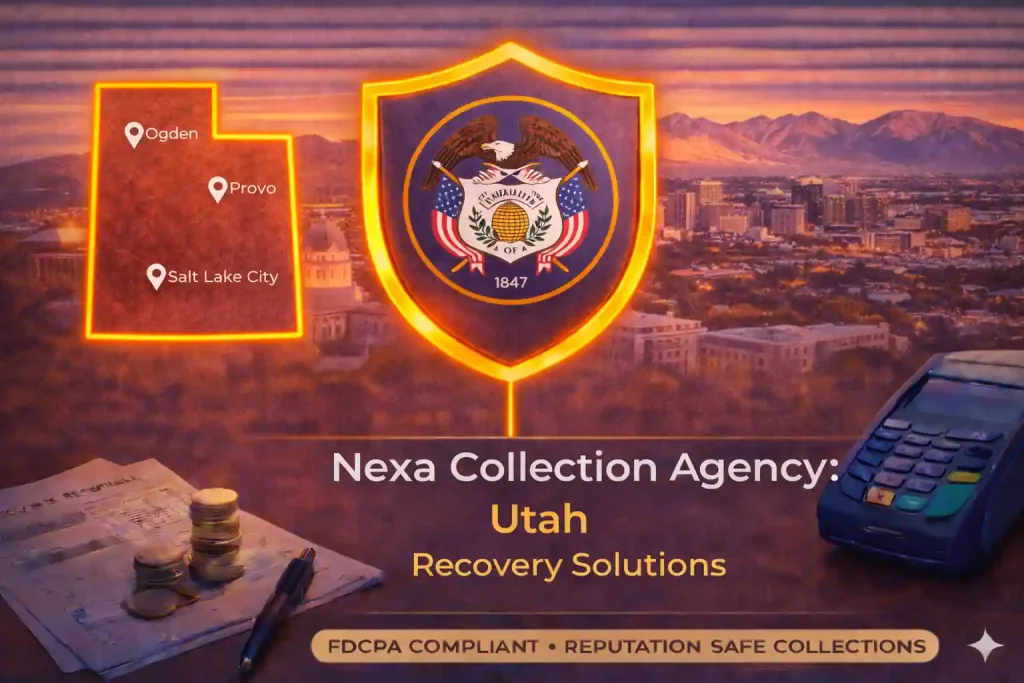In Utah—from the tech-driven Silicon Slopes of Lehi and Draper to the industrial powerhouses of Salt Lake City and the medical hubs of Ogden and Provo—business is built on a “work-first” culture. But in 2026, working hard isn’t enough; you must collect smart. With Utah’s 6-year statute of limitations on written contracts, you have a significant window to recover revenue, but you are now operating under the 2026 Utah Health Care Amendments, which strictly prohibit sending medical bills to collections while an insurance decision is pending. You don’t just need a collector; you need a Utah-licensed strategist who can secure bank levies and property liens while shielding your brand from the heavy fines of the Utah Consumer Sales Practices Act (UCSPA).
Nexa provides 100% reputation-safe, equipped with all 50-state collections license, offering free credit reporting, free litigation/bankruptcy scrubs, and zero onboarding fees. Secure – SOC 2 Type II & HIPAA compliant.
Need a Collection Agency? Contact us
The Utah Legal Landscape
Utah offers a generous window for contract recovery but demands strict adherence to documentation and “Preliminary Notice” rules in the trades.
| Debt Category | Statute of Limitations | Utah Code (U.C.) |
| Written Contracts | 6 Years | U.C. § 78B-2-309 |
| Oral / Open Accounts | 4 Years | U.C. § 78B-2-307 |
| Medical Debt | 4-6 Years | 2026 “Insurance Tolling” |
| Wage Garnishment | 25% Cap (Standard) | U.C. § 70C-7-103 |
| Judgments | 8 Years (Renewable) | U.C. § 78B-5-202 |
Critical Utah Rules for 2026:
-
The “Insurance Pending” Shield (HB 495): As of 2026, Utah law prohibits providers from initiating collection actions (ECA) while an insurance claim is still being processed or under review. Nexa’s workflow includes a mandatory Insurance Verification Audit to ensure your practice never violates this “tolling” period.
-
The 6-Year Tech Window: For SaaS and B2B providers in the Silicon Slopes, Utah’s 6-year written contract statute is a primary tool. We recover high-value subscription and service debt from as far back as 2020 that other states would have written off.
-
SCR Construction Deadlines: Utah utilizes the State Construction Registry (SCR). If you are a contractor or supplier, your lien rights depend on a 20-day preliminary notice. Nexa’s “Step 1” service moves faster than the 90-day lien recording window to trigger payment before your secured status expires.
-
Aggressive Garnishment: Once a judgment is secured, Utah allows for the garnishment of up to 25% of disposable earnings or the amount by which weekly pay exceeds $217.50 (30x the federal minimum wage). We target high-earners in Utah’s booming professional sectors to ensure 100% ROI on legal spend.
Cost-Effectiveness: The Nexa Advantage
-
Fixed-Fee Recovery ($15/account): Ideal for early-stage B2B and medical accounts. Debtors pay 100% directly to you.
-
Contingency Fee Service (20%–40%): Performance-based recovery. No Recovery, No Fee.
Industries We Serve in Utah
-
Silicon Slopes Tech & SaaS: B2B recovery for software-as-a-service, data centers, and tech startups. We specialize in high-value contract disputes and subscription delinquency under Utah’s 6-year written statute.
-
Healthcare, Dental & Medical: 100% HIPAA-compliant. We manage the 2026 Health Care Amendments, recovering patient balances for the Intermountain and University of Utah footprints while navigating insurance-pending restrictions.
-
Mining, Energy & Manufacturing: Specialized recovery for the industrial heartland. We handle high-value freight brokerage and warehousing disputes from Vernal to Logan.
-
Colleges & Universities: From U of U and BYU to regional colleges, we manage tuition recovery with a focus on student-first mediation that preserves your institutional reputation.
-
K-12 Private & Charter Schools: Diplomatic recovery for unpaid enrollment fees, tailored for Utah’s diverse and rapidly growing charter school network.
-
Accountants & CPA Firms: Recovery of professional service fees. We understand the “net-30” billing cycle and preserve your client rapport through professional mediation.
-
Banks & Credit Unions: Expert handling of delinquent consumer loans using Utah’s 8-year judgment renewal window and aggressive garnishment laws.
-
Construction & Trades: Revenue recovery for HVAC and general contractors (Experts in Utah Title 38 Mechanic’s Liens and SCR compliance).
Recent Utah Recovery Results
Case 1: Provo-Area Specialty Surgical Center (Medical)
-
The Problem: $118,000 in aging patient debt. The clinic was wary of 2026 “Insurance Tolling” rules and needed a compliant way to recover.
-
The Result: Nexa performed a full insurance audit and implemented a compliant “Mediation First” strategy, recovering $82,000 in 65 days via voluntary settlement plans.
Case 2: Draper-Based SaaS Provider (B2B)
-
The Problem: A $55,000 unpaid multi-year service contract from a regional client who went silent after a merger.
-
The Result: Utilizing Utah’s 6-year written contract statute, Nexa secured a full $55,000 recovery plus interest in just 22 days by presenting a litigation-ready pre-legal demand to the new board.
Frequently Asked Questions (FAQ)
1. Can you collect a 5-year-old bill in Utah?
Yes. For written contracts, Utah Law (U.C. § 78B-2-309) allows for a 6-year window. Nexa can audit your older ledgers to find revenue that other agencies assume is expired.
2. Is it true I cannot send a medical bill to collections if insurance is pending?
Under the 2026 Utah Health Care Amendments, providers must toll the collection period until an insurance determination is finalized. Nexa’s system is hard-coded to handle these delays, protecting you from UCSPA violations.
3. What happens if I miss the 90-day lien window?
In Utah, if you miss the 90-day window to record a lien after a Notice of Completion, your secured status is at risk. Nexa’s “Step 1” demand is designed to trigger payment before this critical deadline.
Popular Cities:

